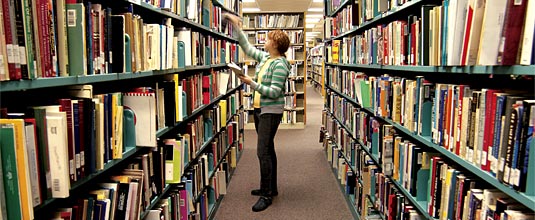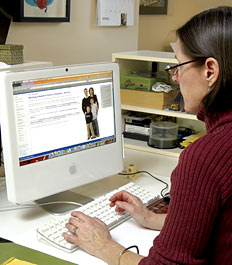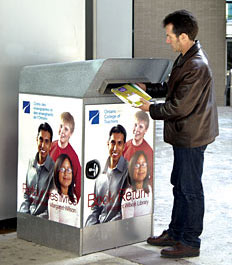|
Use More Than Your Wordsby Leanne Miller |

Finding Resources You Needby Lois BrowneOngoing learning is at the heart of effective teaching practice, so Ontario teachers are fortunate in having uninterrupted access to a range of professional libraries – for their own learning and that of their students – throughout their careers. Teacher candidates are exposed to professional libraries of research and curriculum materials by faculties of education during their teacher education programs. And those who go on to work for one of the larger school boards will have access to extensive professional development materials for staff and teaching resources. Electronic communication and online access to catalogue and journal databases means teachers can receive materials via e-mail or have them couriered directly to their school. But teachers who work for smaller boards or in highly specialized fields, as well as those who don’t have regular work, may have less access to professional development and curriculum materials. Many turn to the College’s Margaret Wilson Library, where online access to the catalogue, research help and electronic and mail delivery of materials are the norm. The facultiesJames Watson, president of the Ontario Teacher Education Library Association and an information services librarian at Trent University, says that “the big issue for faculty of education librarians is making sure we get a wide variety of print and electronic materials primarily for our teacher candidates. “Most of our collections will have a mix of curriculum items like text books, activity files, juvenile literature – anything that teachers might need in the classroom.” Some have materials in English and French, as well as several First Nations languages. Librarians generally feel that there are great resources available to teachers but that few teachers are aware of how many. A few faculty libraries in Ontario offer online searches and most allow in-person access. While borrowing policies vary, many do offer the privilege – either for free or for a small monthly or annual fee – to alumni and teachers in their communities. “Our resources could be used more,” says Kim Pelchat, manager of the Instructional Resource Centre at Brock University. “We have two curriculum libraries – one for each of our campuses, Brock and Hamilton, with courier service between them twice a week.” OISE/UT has the largest curriculum resource library in the country, says Acting Chief Librarian Marian Press. “Most teachers who come to use our curriculum library tend to be our own graduates,” says Press, “but anybody can look at materials on site,” including practising teachers. Like Pelchat, Press thinks the library’s resources could be better used “even by our own students.” The boardsThe Toronto DSB Professional Library is geared to its teaching, administrative and research staff, and gets a lot of use by teachers who have Special Education students as well as by social workers and speech and language experts. “Board staff members also use the library to support their own professional development, if they are taking AQ courses, or for their work on committees,” says Rowan Amott, unit co-ordinator for the library. “In the old days, we had to go through a fairly elaborate search process to compile information. Now teachers can do the search themselves. People are finding resources online a lot more than they used to,” Amott says. The CollegeFew school boards can match the resources of the Toronto DSB. For teachers who don’t have access to those or who can’t find what they need in their university or school board library, the College library is the next logical choice. “We’re particularly useful to teachers who aren’t regular board employees or who work for a smaller board, such as a French-language board. Those who are on leave or who live some distance from a professional library also find us really useful,” says Olivia Hamilton, the College’s library technician. “We’ve sent materials to the farthest corners of the province.” The College boasts a growing collection with more 6,000 education-related resources in English and French, including books, videos, journals and full-text databases of professional journal articles.
Émile Banodji Kadissia, a teacher at École élémentaire catholique Sacré-Coeur in Toronto, regularly borrows teaching and professional development resources from the Margaret Wilson Library. “The library has the French-language books I’ve needed for my AQ courses in Special Education and Junior Education,” says Banodji Kadissia. Sylvia Kwan, a Toronto teacher since 1986 who is currently on maternity leave, has found the College library a real boon. “I have very young children, so getting out to a library is next to impossible. It’s wonderful to be able to go online, look at titles, check off what I want and have the books mailed to me. And then I can mail them back,” she says. Kwan recently presented a paper at a conference for educators of the gifted, using materials exclusively from the College library. She plans to take the Special Education Part 2 AQ before returning to teaching next September and expects to use the College library for some of her studies. Barbara Dion, an itinerant teacher of students who are deaf or hard of hearing for the Greater Essex County DSB, says, “My field is a specialized field and the College has relatively current materials that I can’t get anywhere else. And the staff are very helpful with searches.” The College is mandated to provide for the ongoing learning of its members, says Hamilton, which means “whatever makes you a better teacher. We have strong collections on topics such as mentoring, Special Education, classroom management and leadership. And our French-language resources are also growing steadily. “Almost 12,000 items were borrowed last year, and most of those were mailed out. In fact, online requests in 2007 increased 47 per cent over the previous year.” Monthly updates regarding the College library are available through the Members’ Area of the College web site. |










